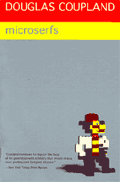 This book review was originally published in the Baltimore Evening Sun on June 26, 1995.
This book review was originally published in the Baltimore Evening Sun on June 26, 1995.
Disregard that old phrase about how you can’t judge a book by its cover when you read Douglas Coupland’s Microserfs. The 33-year-old Canadian’s novels are so accurately conveyed by their packaging that sometimes I wonder whether Coupland’s just hacking out text under the whip of a nefarious cabal of publishing art directors. This would, of course, involve a cross-corporation conspiracy between St. Martin’s Press, Simon & Schuster and publishing magnate Judith Regan (who has brought us, among others, Beavis & Butt-Head’s Ensucklopedia and Robin Quivers’ bio). But that doesn’t hurt my theory a bit.
Take 1991’s Generation X, for example. In order to appeal to a new generation that’s a notoriously bad market for books, the publishers printed Coupland’s debut novel in a large, unconventional size that juts a few inches beyond just about every trade hardback in existence. The story, too, is loud and filled with large pronouncements about the status of a generation and padded with flip pop culture references.
Then there’s last year’s Life After God, small and unassuming in size with a swimming baby adorning the front cover. True to form, the eight modest stories inside are brief and consciously childlike in their directness. Life After God is a vacation from Coupland-as-usual — less sarcasm, less name-dropping, less stylish than either Gen X or its 1992 follow-up, Shampoo Planet.
So where does that leave us with Coupland’s new novel Microserfs? Well, it’s flashy and glaring and bright like its tinfoilish cover. It’s populated with too-quirky-for-their-own-good characters like the hip twentysomething Lego businessman in the bottom right corner of the book jacket. And, with a few exceptions, it’s as thin as the compressed bible paper it’s printed on.
The narrator of Microserfs, one Daniel Underwood, is a software bug checker at Microsoft who types out his story in the form of journal entries on his Apple Powerbook. He works long nights for little pay or prestige, chats incessantly with his buddies via e-mail, and plays parent to his aging Boomer parents. (Dad has recently been laid off after a score of productive working years at Big Blue.)
Then Daniel and half-a-dozen or so of his fellow Microserfs strike out on their own for new territory. They form a company called Interiority and begin designing its flagship product: a virtual Lego block tool they call “Oop!” Steering through the obstacle course of venture capitalists and Las Vegas trade shows and programming glitches, the Oop!ers spend the remainder of the novel discussing television, coming out of the closet, starting and ending romances, and behaving in those stereotypical ways you see Generation Xers behaving on MTV and Zima commercials.
Coupland goes a long way toward redeeming Microserfs in his last chapter, when his characters finally stop talking so much about the computer revolution and start showing us what it’s all about. The book’s last few pages in particular reveal a surprisingly touching vision of cyber reality where the boundaries between human and machine have become suddenly nonexistent. It feels like a larger metaphor has just snapped into place for the plodding 250 pages that preceded.
Well, maybe Coupland doesn’t deserve so much cynicism. You can open just about any page at random and find a nice, pithy slogan for our culture as it heads to the next millennium. Like this one, which I’ve picked at random: “The modern economy isn’t about the redistribution of wealth — it’s about the redistribution of time.” Or this one: “What if machines do have a subconscious of their own? What if machines right now are like human babies, which have brains but no way of expressing themselves except screaming (crashing)?”
But a novel is not a 365-Days-a-Year desk calendar, and you can’t help but wonder after a while if Coupland had a master plan or scheme for his book, or if he just wrote the thing in one protracted burst of energy. Or if he’s in cahoots with the art department to come up with marketing profiles for Generation X to be sold to MTV, Zima, and the Rollerblade Company.
Sounds plausible to me: a TV show for Microserfs is already on the way.